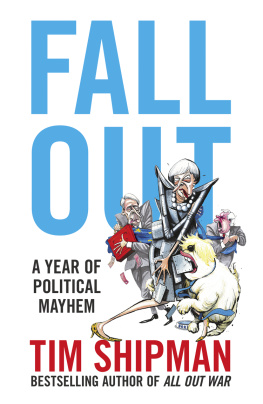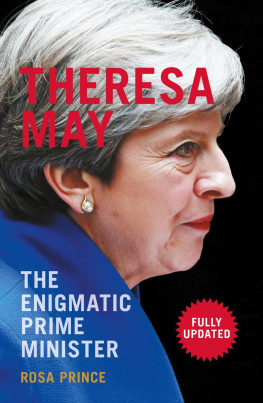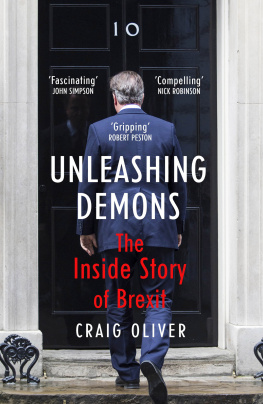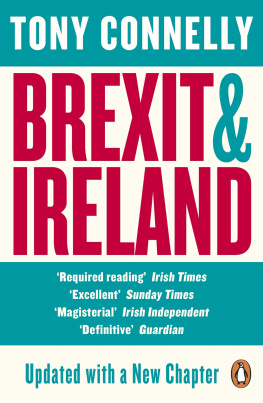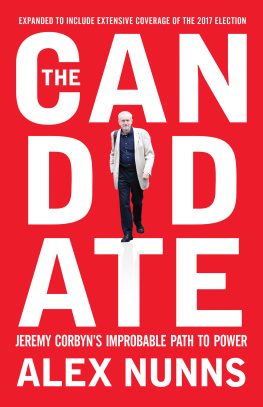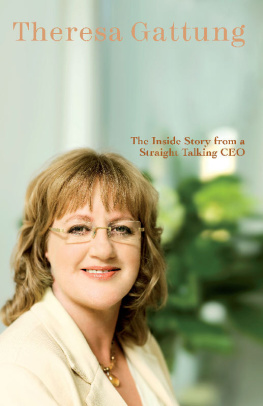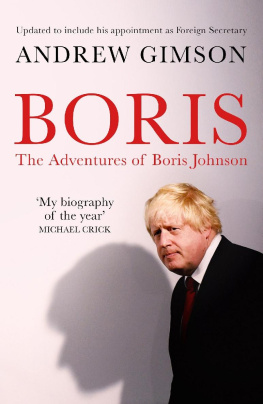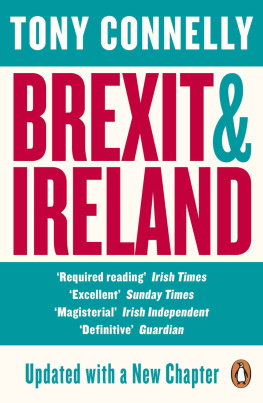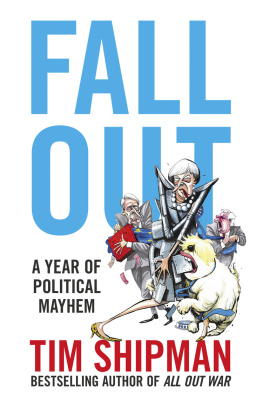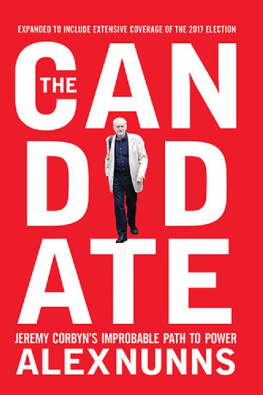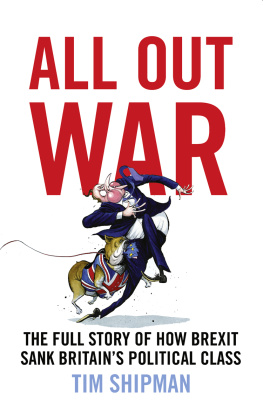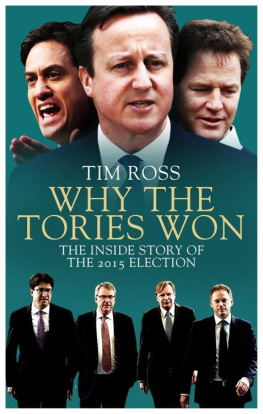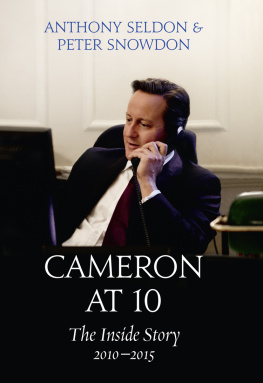William Collins
An imprint of HarperCollinsPublishers
1 London Bridge Street
London SE1 9GF
www.WilliamCollinsBooks.com
This eBook first published in Great Britain by William Collins in 2017
Copyright Tim Shipman 2017
Cover illustration by Morten Morland/Spectator
Tim Shipman asserts the moral right to be identified as the author of this work
A catalogue record for this book is available from the British Library
All rights reserved under International and Pan-American Copyright Conventions. By payment of the required fees, you have been granted the non-exclusive, non-transferable right to access and read the text of this e-book on screen. No part of this text may be reproduced, transmitted, downloaded, decompiled, reverse engineered, or stored in or introduced into any information storage retrieval system, in any form or by any means, whether electronic or mechanical, now known or hereinafter invented, without the express written permission of HarperCollins e-books.
Source ISBN: 9780008264383
Ebook Edition November 2017 ISBN: 9780008264390
Version: 2017-11-14
For Charlotte
fall out v.
1 quarrel
3 come out of formation
fallout n.
1 radioactive debris caused by a nuclear explosion or accident
2 the adverse side effects of a situation
The Concise Oxford Dictionary (1991 edn)
It is not the critic who counts; not the man who points out how the strong man stumbles, or where the doer of deeds could have done them better. The credit belongs to the man who is actually in the arena, whose face is marred by dust and sweat and blood; who strives valiantly; who errs, who comes short again and again, because there is no effort without error and shortcoming; but who does actually strive to do the deeds; who knows great enthusiasms, the great devotions; who spends himself in a worthy cause; who at the best knows in the end the triumph of high achievement, and who at the worst, if he fails, at least fails while daring greatly, so that his place shall never be with those cold and timid souls who neither know victory nor defeat
Theodore Roosevelt, 23 April 1910
Everybody has a plan until they get punched in the mouth
Mike Tyson
Contents
This is the second book I never intended to write. Just as with All Out War, my 2016 book on the Brexit referendum campaign, Fall Out is the product of extraordinary events. The original intention was to add a few chapters to All Out War to bring the Brexit story up to date with the declaration of Article 50 in the spring of 2017. Then Theresa May called a general election and the inexorable logic of writing a sequel overwhelmed me. The fallout from the EU referendum and the general election is still with us. It was perhaps the most extraordinary of my lifetime. It led the Tory Party to fall out with itself and fall out of formation.
This book is based on more than one hundred interviews conducted primarily between July and October 2017. Last time I listed most of the primary sources. This time I have not done so since many more of them are still in prominent posts and most were reluctant to be named. That said, only a very small number of people refused to cooperate. Those who talked to me include fifteen members of Theresa Mays Downing Street staff, twenty ministers, including thirteen of cabinet rank, more than twenty-five Tory campaign staff, more than a dozen senior figures in the Labour Party, the shadow cabinet, Jeremy Corbyns office and the trade unions, as well as civil servants, special advisers, diplomats, former ministers, MPs and pollsters.
During the time covered by this book I interviewed Theresa May three times and accompanied her on her visit to the White House. I also conducted on-the-record interviews with David Davis, Boris Johnson, Damian Green, Michael Gove, John McDonnell, Nigel Farage, Arron Banks and Michael Fallon. I have drawn on the unpublished transcripts of these conversations.
As before, some people agreed to certain observations being on the record but most of the time we spoke on the understanding that I would construct a narrative of events without signalling the origin of every fact and quote. Where I have directly quoted someone or attributed thoughts or feelings to them, I have spoken to them, the person they were addressing, someone else in the room who observed their behaviour, or someone to whom they recounted details of the incident or conversation. You should not assume that the obvious source is the correct one. Many of those who spoke to me off the record have written newspaper articles, given interviews or spoken publicly about their views. Where this is the case I have footnoted published sources in the text.
I will repeat a couple of stylistic warnings I issued in All Out War. Westminster is a profane place and I have sought to capture the language of the age. Be warned. Peers are referred to by the name by which they are best known. Knights of the realm are Sir on first usage then stripped of their titles. In no ones world is Stephen Gilbert, Lord Gilbert of Panteg and anyone who has tried to call Lynton Crosby Sir gets a look that discourages repetition.
The Brexit negotiations and the general election are a complex series of interlocking and overlapping events. In seeking to impose narrative order not everything is presented in strictly chronological order. This felt necessary to prevent Fall Out descending into a recitation of one damn thing after another. Part One covers the negotiations over Brexit between September 2016 and March 2017, when Theresa May triggered Article 50. Part Two covers the internal battles of the May government which pitted her chiefs of staff against other senior members of the administration to try to explain how the culture they had created affected the election campaign and their own demise. Part Three covers the election and Part Four the subsequent leadership plotting and its implications for Brexit.
With events still live there are many people who will not like what they find in these pages. We do not know yet how Brexit will end or how the 2017 election will impact on the future history of the Conservative Party, still less whether 2017 represented the beginning of the end or the end of the beginning for Theresa May and Jeremy Corbyn. I have sought to honestly convey the events as they seemed to the participants at the time. My personal view is that Britain must make the best of its future. Good people on both sides of the referendum result have a role to play. Capitalising on the benefits of Brexit requires a cold-eyed understanding of the complications.
While people have behaved with conviction as well as ambition they have not always behaved well. I have known Nick Timothy and Fiona Hill for a decade. If I have highlighted some of the extremes of their characters as they were experienced by others, I can only say my own contacts with them have almost always been positive. Both are dedicated public servants and away from the stresses of office charming company. If they did not always seem so to colleagues, it is worth remembering that all the best political operators I have known Damian McBride, Dominic Cummings and Alastair Campbell among them have been divisive figures.
At HarperCollins I am deeply indebted to the incomparable Arabella Pike, whose image will adorn the next edition of the Illustrated Oxford Dictionary alongside the word sangfroid. I hope she persuades David Cameron to file quicker than I did. Robert Lacey and Iain Hunt dealt with a mountain of words with similar forbearance. Im also grateful to Marianne Tatepo, who sorted the pictures and much else besides and the legendary Helen Ellis. My agent, Victoria Hobbs, and all at A. M. Heath kept up my morale at key moments.

